2024届高考英语语法专题突破 非谓语动词课件(共92张PPT)
文档属性
| 名称 | 2024届高考英语语法专题突破 非谓语动词课件(共92张PPT) |

|
|
| 格式 | pptx | ||
| 文件大小 | 619.4KB | ||
| 资源类型 | 教案 | ||
| 版本资源 | 通用版 | ||
| 科目 | 英语 | ||
| 更新时间 | 2024-04-20 00:00:00 | ||
图片预览


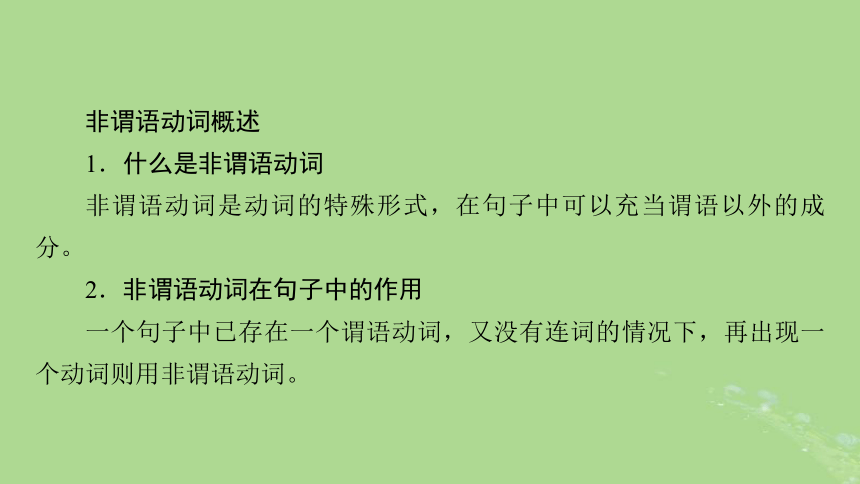
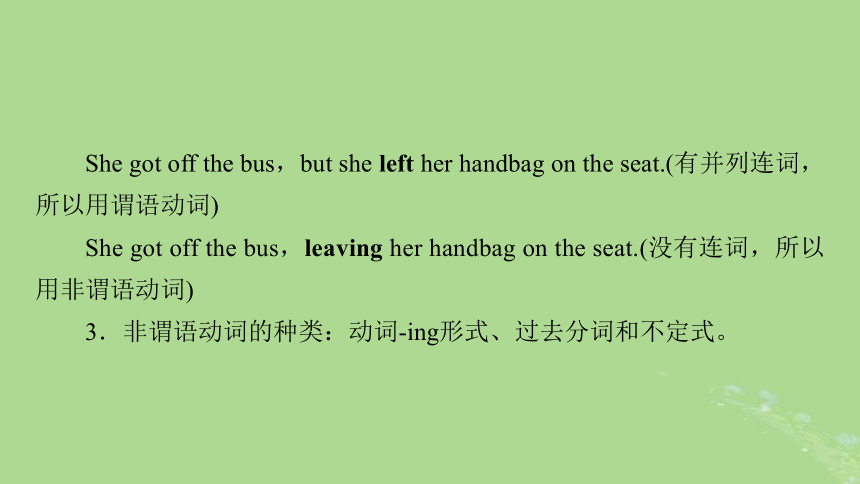


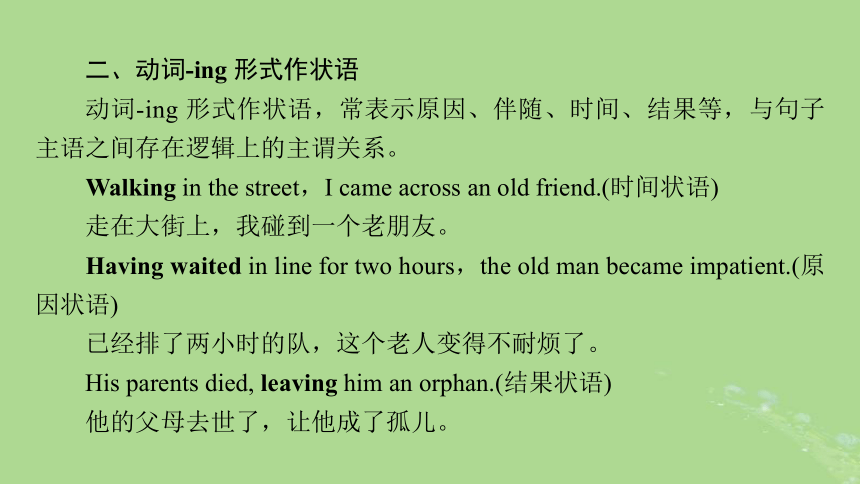
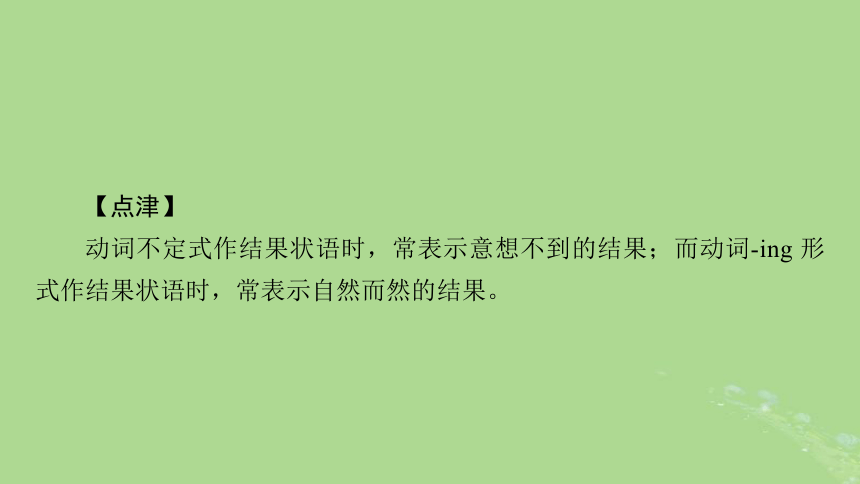
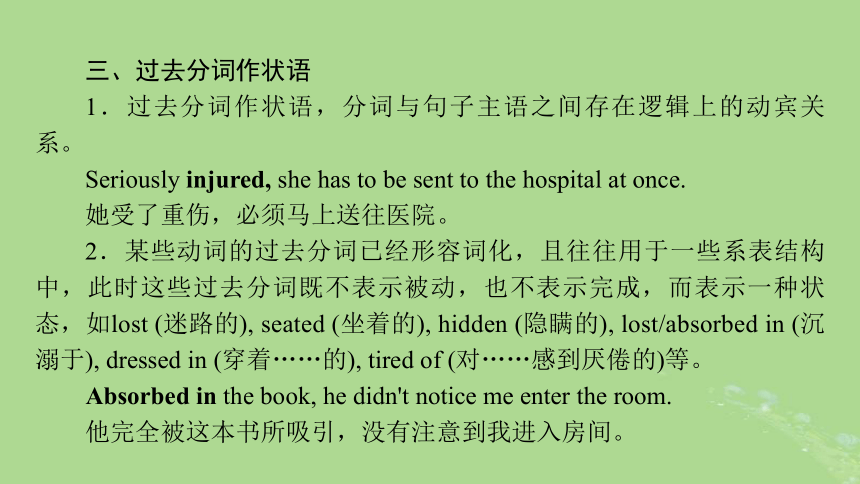

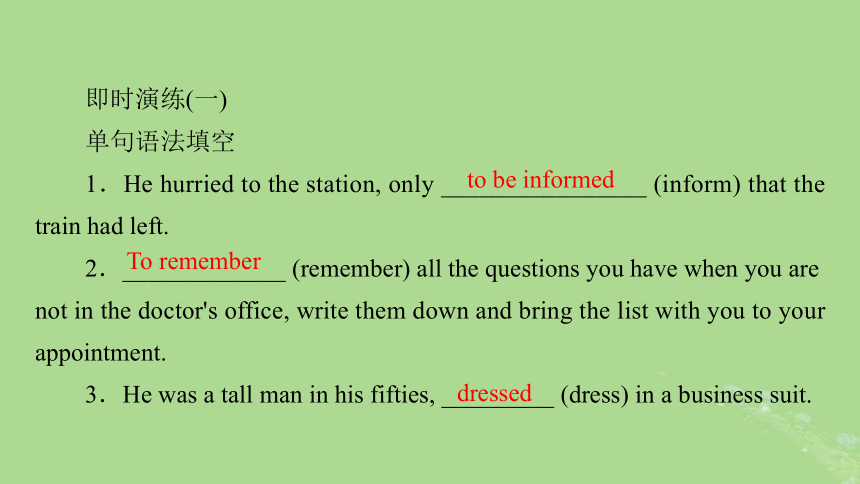
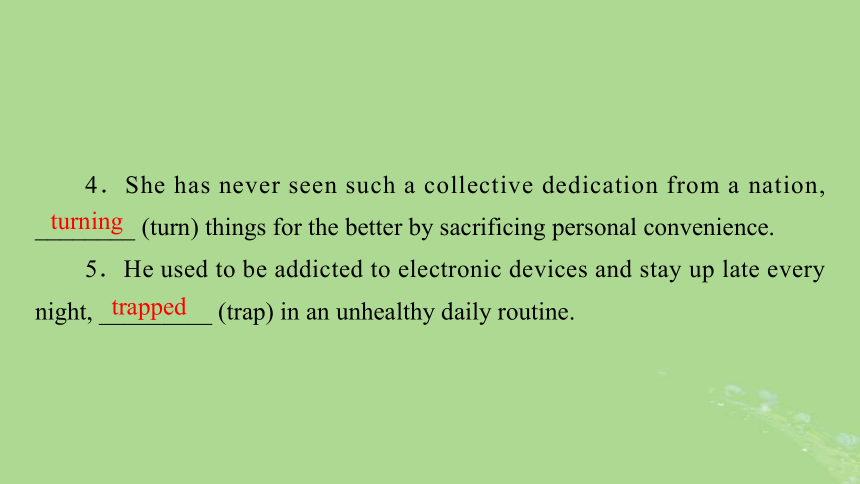
文档简介
(共92张PPT)
第二讲 非谓语动词
考点突破 · 精讲即练
非谓语动词概述
1.什么是非谓语动词
非谓语动词是动词的特殊形式,在句子中可以充当谓语以外的成分。
2.非谓语动词在句子中的作用
一个句子中已存在一个谓语动词,又没有连词的情况下,再出现一个动词则用非谓语动词。
She got off the bus,but she left her handbag on the seat.(有并列连词,所以用谓语动词)
She got off the bus,leaving her handbag on the seat.(没有连词,所以用非谓语动词)
3.非谓语动词的种类:动词-ing形式、过去分词和不定式。
考点一 非谓语动词作状语
一、动词不定式作状语,表示目的、结果、原因等
1.作目的状语,有时也用in order to或so as to,但so as to不用于句首。
(2022·全国甲卷满分作文)We will continue our campaign to prevent and control ocean pollution to make our oceans clean.
我们将继续我们的运动,以预防和控制海洋污染,使我们的海洋变得干净。
2.作结果状语,常用结构enough to, too...to..., only to 等。
I'm too tired to stay up any longer.
我太累了,实在不能再熬夜了。
3.作原因状语,此时常与表示情感的形容词连用,如glad, happy, frightened, surprised 等。
I was frightened to find that in front of my door sat a dog.
我惊恐地发现我家门前坐着一只狗。
二、动词-ing 形式作状语
动词-ing 形式作状语,常表示原因、伴随、时间、结果等,与句子主语之间存在逻辑上的主谓关系。
Walking in the street,I came across an old friend.(时间状语)
走在大街上,我碰到一个老朋友。
Having waited in line for two hours,the old man became impatient.(原因状语)
已经排了两小时的队,这个老人变得不耐烦了。
His parents died, leaving him an orphan.(结果状语)
他的父母去世了,让他成了孤儿。
【点津】
动词不定式作结果状语时,常表示意想不到的结果;而动词-ing 形式作结果状语时,常表示自然而然的结果。
三、过去分词作状语
1.过去分词作状语,分词与句子主语之间存在逻辑上的动宾关系。
Seriously injured, she has to be sent to the hospital at once.
她受了重伤,必须马上送往医院。
2.某些动词的过去分词已经形容词化,且往往用于一些系表结构中,此时这些过去分词既不表示被动,也不表示完成,而表示一种状态,如lost (迷路的), seated (坐着的), hidden (隐瞒的), lost/absorbed in (沉溺于), dressed in (穿着……的), tired of (对……感到厌倦的)等。
Absorbed in the book, he didn't notice me enter the room.
他完全被这本书所吸引,没有注意到我进入房间。
【点津】
独立成分作状语,其形式不受上下文的影响。常用的有considering that...(鉴于……;考虑到……);generally speaking(总的来说); judging by/from...(从……来看;依据……来判断); supposing that...(假定……); providing that...(假定……); owing to...(由于……); talking/speaking of...(谈及……); given that...(考虑到……);provided that...(如果……); to tell the truth (实话实说);to be honest (老实说)等。
即时演练(一)
单句语法填空
1.He hurried to the station, only ________________ (inform) that the train had left.
2._____________ (remember) all the questions you have when you are not in the doctor's office, write them down and bring the list with you to your appointment.
3.He was a tall man in his fifties, _________ (dress) in a business suit.
to be informed
To remember
dressed
4.She has never seen such a collective dedication from a nation, ________ (turn) things for the better by sacrificing personal convenience.
5.He used to be addicted to electronic devices and stay up late every night, _________ (trap) in an unhealthy daily routine.
turning
trapped
考点二 非谓语动词作定语
一、动词不定式作定语
动词不定式作定语通常置于所修饰的名词或代词之后,与所修饰的词之间构成逻辑上的主谓关系、动宾关系或同位关系。
(1)当被修饰词是序数词或被序数词,the only,the next等修饰时,常常用to do 作定语。
She is always the first to come and the last to leave.(主谓关系)
她总是第一个来,最后一个离开。
(2)用在固定句型sb.have sth.to do和 there be sth.to do中。
Students complain that they have endless homework to do every day.(动宾关系)
学生们抱怨他们每天有做不完的作业。
(3)修饰某些名词,如chance,opportunity,way,ability,plan,appeal,privilege等。
His last appeal to come and see her went unanswered.(同位关系)
没有人答应他最后要来看她的请求。
二、动词-ing形式作定语
1.该动词与被修饰的名词之间为主谓关系或用来表示正在进行的动作时,用动词-ing 形式。
The lecture, starting at 7 o'clock last night, was followed by an observation of the moon with telescopes.
这次演讲开始于昨天晚上7点,紧接着是用望远镜观看月球的活动。
【点津】
被修饰的名词与动词-ing之间为被动关系且表示正在进行时,用动词-ing形式的被动式作定语。
2.表示被修饰词的某种用途,在意义上相当于“名词+for+doing”,此时动词-ing形式常置于被修饰词的前面。
a swimming pool=a pool for swimming游泳池
a waiting room=a room for waiting候车室
三、过去分词作定语
过去分词作定语,分词与被修饰的名词之间是逻辑上的动宾关系。
Tsinghua University, founded in 1911, is home to a great number of outstanding figures.
建于1911 年的清华大学培养出了众多杰出人物。
【点津】
作定语的不及物动词的分词形式有doing和done两种。doing 表示正在进行;done表示已经完成。
即时演练(二)
单句语法填空
1.They held hands as Mark was wheeled into the ___________ (operate) room.
2.I admit I was too scared at that moment and the uncle __________ (stand) beside me was giving me an awkward look.
3.The report, which was published in The Lancet in 2019, was based on research done with students ______ (age) 11 to 17 in 146 different countries.
operating
standing
aged
4.In my everyday life, I am on an ongoing journey to figure out different ways ___________ (reduce) my carbon footprint on the planet.
5.They find comfort among the shelves ________ (pack) high with books and appreciate the smiling faces of librarians eager to help.
to reduce
packed
考点三 非谓语动词作补足语
1.感官动词和短语(see,watch,observe,notice,look at,hear,listen to,feel)后面的宾语补足语常见的非谓语动词形式有三种(do, doing, done)。do表示主动和完成(被动句中动词不定式符号to要还原),doing表示主动或正在进行,done 表示被动或完成。
The missing boy was last seen playing near the river.
失踪的男孩最后一次被看到时正在河边玩耍。
I hear the song sung every time I pass by the coffee shop.
每当我经过这家咖啡屋,我都能听到有人唱这首歌。
I often hear the girl sing the song which is popular recently.=The girl is often heard to sing the song which is popular recently.
我经常听到这个小女孩唱这首最近很流行的歌。
2.动词let, make, have, get, leave, keep, find,catch后接非谓语动词形式作宾语补足语。
On the contrary, those who let teenagers experience the consequences of their actions can do better.
相反,那些让青少年体验他们行为后果的人能够做得更优秀。
She had to raise her voice to make herself heard.
她不得不提高嗓门使自己被听到。
The headmaster was angry to catch some students smoking again.
又一次抓住一些学生吸烟,校长很生气。
3.固定短语(如advise/allow/encourage/request/warn/invite sb. to do sth.等)中动词不定式作宾语补足语。
I am writing to invite you to come to my birthday party.
我写信邀请您来参加我的生日晚会。
4.with/without的复合结构:with/without+名词/代词+doing (表示主动、进行)/done(表示被动、完成)/to do(表示目的、将来)。
Without anyone noticing me, I stole into the room.
没有人注意到我,我偷偷溜进了房间。
With his hair cut,he looked much younger.
理了发,他看起来年轻多了。
With a lot of homework to do,I can't go skating with you.
因为有很多作业要做,所以我不能和你一起去滑冰。
即时演练(三)
单句语法填空
1.She returned home, only to find the door open and a number of things ______ (go).
2.With a lot of difficult problems _________ (settle), he can't get home early.
3.With the boy _________ (lead) the way, the soldiers managed to walk through the forest.
gone
to settle
leading
4.Not seeing or hearing any fire engines _____________ (approach), Grant rushed to a side entrance and ran up the stairs.
5.Fu believes it was his scientific approach to training that enabled him _____________ (overcome) those difficulties and reach his destination.
approaching
to overcome
考点四 非谓语动词作宾语
1.下列动词只能用动词不定式作宾语
decide/determine, learn, want, expect/hope/wish, refuse, afford, manage, pretend, offer, promise, choose, plan, agree, ask/beg, help 记忆口诀
决心学会想希望
拒绝给予设法装
主动答应选计划
同意请求帮一帮
She pretended not to see me when I passed by.
当我经过时,她假装没看见我。
2.下列动词只能用动词-ing形式作宾语
avoid, miss, delay, suggest, finish, practice, enjoy, imagine, resist, admit, deny, envy, escape, risk, pardon, stand, keep, mind 记忆口诀
避免错过少延期
建议完成多练习
喜欢想象禁不住
承认否定与妒忌
逃脱冒险莫原谅
忍受保持不在意
We enjoy reading English stories.
我们喜欢读英语故事。
【点津】
如果作宾语的动词不定式有宾语补足语时,常用it作形式宾语,将真正的宾语后置。
I find it impossible to change her idea.
我发现改变她的想法是不可能的。
①I meant to go, but my father would not allow me to.
我想去,但是我的父亲不让我去。
②Raising wages means increasing purchasing power.
提高工资意味着增加购买力。
4.“疑问词+动词不定式”结构
动词不定式可以与疑问代词和疑问副词(why除外)等连用,构成动词不定式短语,在句中作主语、表语、宾语、宾语补足语、同位语等。
I didn't know how to get back to the village.
我不知道怎样回到村子。
Experience tells you what to do; confidence allows you to do it.
经验告诉你做什么,而信心让你去做这件事。
5.固定结构“do/have/其他动词+sth.+but/except (to) do sth.”中的动词不定式用法:要遵循前有实义动词do,but/except后则无to,反之则有to的原则。
She had no choice but to cry in the face of the difficulty.
面对困难,除了哭泣,她别无选择。
即时演练(四)
单句语法填空
1.Eventually Deere expects ______ (add) other tasks to the autonomous
tractor.
2.There is no denying that China is one of the most successful countries in __________ (green) the desert.
3.I'm considering ________ (buy) an iPad, which is considered to be a useful tool.
to add
greening
buying
4.As a result of the serious flood, two-thirds of the buildings in the area need ________________________ (repair).
5.Even though people initially laughed at him, he finally managed _________ (give) his hometown a path available to the nearby town.
repairing/to be repaired
to give
考点五 非谓语动词作主语、表语
一、非谓语动词中可以作主语的有动词-ing形式和动词不定式
1.动词-ing形式作主语表示一般的、抽象的或习惯性的动作;动词不定式作主语表示具体的、一次性的或尚未发生的动作。
Facing up to your problems rather than running away from them is the best approach to working them out.
直面问题而不是逃避问题才是解决问题的最佳途径。
2.it作形式主语,代替真正作主语的动词不定式或动词-ing形式,常见句型如下:
It is/was no use/good doing sth.; It is/was not any use/good doing sth.; It is/was of little use/good doing sth.; It is/was useless doing sth.; It's a waste of time doing sth.; It takes sb. some time to do sth.;It is easy/important/vital/necessary/difficult (for/of sb.) to do sth.等。
It's important for the figures to be updated regularly.
经常性地更新数据是非常重要的。
二、非谓语动词中能作表语的有动词-ing形式、过去分词和动词不定式
动词-ing形式作表语意为“令人感到……的”,而过去分词作表语意为“感到……的”。
Please describe a dog that is frightening.
请描述一只令人害怕的狗。
Please describe a dog that is frightened.
请描述一只惊恐的狗。
【点津】
get, become, look, seem, appear 等系动词后可跟过去分词作表语,表示被动或主语的状态。
This quotation from Winston Churchill tells us that we shouldn't get discouraged right after failure.
温斯顿·丘吉尔的这句话告诉我们,失败后不应该气馁。
即时演练(五)
单句语法填空
1.It's no good ____________ (regret) your past mistakes.
2.Fortunately, nowadays it is much easier _________ (make) eco-friendly lifestyle choices.
3.I got caught in the traffic jam and I'm not sure how long it will take ___________ (arrive) at the airport.
regretting
to make
to arrive
4.What worried the child most was his ___________________ (not, allow) to visit his mother in the hospital.
5.It is, therefore, urgent ___________ (update) our curricula by introducing the recent developments in the relevant fields.
not being allowed
to update
考点六 非谓语动词的时态和语态
类别 时态形式 语态形式 主动 被动
动词不 定式 一般式 to do to be done
进行式 to be doing
完成式 to have done to have been done
动词-ing 形式 一般式 doing being done
完成式 having done having been done
过去分词 一般式 done
一、主动形式和被动形式
非谓语动词与逻辑主语(通常是句子的主语)之间存在主谓或动宾关系。与逻辑主语之间存在主谓关系时,用主动形式;与逻辑主语之间存在动宾关系时,用被动形式。
The meeting to be held tomorrow is of great importance.
明天举行的会议非常重要。
二、时间先后关系
根据非谓语动词与谓语动词表示的动作之间的时间先后关系定时态。
1.非谓语动词所表示的动作发生在谓语动词所表示的动作之后或同时发生,用非谓语动词的一般式。
2.非谓语动词所表示的动作发生在谓语动词所表示的动作之前,用非谓语动词的完成式。
Having finished his homework, he went to bed.
他完成作业后就去睡觉了。
即时演练(六)
单句语法填空
1.The novel is believed to ______________________ (translate) into ten foreign languages so far.
2.The manager, _____________ (make) it clear that he didn't agree with us, left the meeting room.
3.____________________ (talk) to change my attitude, I finally got the right way to rid myself of carelessness and gained confidence as well.
have been translated
having made
Having been talked
4.The police are said ___________________ (undertake) detailed investigations into the case at present.
5.In fact, much remains ___________________________(learn) about traditional Chinese painting and its elements.
6.(2023·四川省高职单招)The Olympic Games, first _______ (play)in 776 BC, did not include women players until 1912.
to be undertaking
to be learned/to be learnt
played
集训夯基 · 素养提能
Ⅰ.单句语法填空
1.(2023·北京卷)She called for action ____________(address)the struggles of people around the world ________ (face) “too little water or too dirty water”.
解析:考查非谓语动词。句意:她呼吁采取行动,解决世界各地面临“水太少或水太脏”的人们的斗争。分析句子结构可知,第一空address在句中作目的状语,故用不定式。故填to address。分析句子结构可知,第二空face与逻辑主语people构成主动关系,故用现在分词作后置定语。故填facing。
to address
facing
2.(2023·全国甲卷)For thousands of years,people have told fables(寓言) ________ (teach) a lesson or to pass on wisdom.
解析:考查非谓语动词。此处与to pass on wisdom并列作目的状语。故填to teach。
to teach
3.(2023·新课标Ⅰ卷)Nanxiang aside,the best Xiao long bao have a fine skin,allowing them ______________ (lift) out of the steamer basket without tearing or spilling any of their contents.
解析:考查非谓语动词。根据搭配allow sb. to do sth.“允许某人做某事”可知,空处需用动词不定式作宾语补足语,补足语lift out与宾语them(指代小笼包)是逻辑上的被动关系,空处需填动词不定式的被动式。故填to be lifted。
to be lifted
4.(2023·全国乙卷)Beijing is a city bridging the ancient and the modern.From Buddhist temples to museums,narrow hutong to royal palaces,it is home to more than 3,000 years of glorious history even down to its layout,with the city keeping its carefully _______(build) system of ring roads.
解析:考查非谓语动词。这里为非谓语动词作定语,表示“精心建造的……”,和被修饰词“system of ring roads”之间为被动关系,用过去分词。故填built。
built
5.(2023·全国乙卷)________________(visit) several times over the last 10 years,I was amazed by the co-existence of old and new,and how a city was able to keep such a rich heritage(遗产) while constantly growing.
解析:考查非谓语动词。这里为非谓语动词充当状语,和主句主语“I”之间为主动关系;根据时间状语“over the last 10 years”可知,用现在完成时态,由此推断,空处用现在分词的完成式;置于句首,首字母应大写。故填Having visited。
Having visited
6.(2023·全国乙卷)As a photographer,I have spent the last two years ___________(record) everything I discovered.
解析:考查非谓语动词。spend time (in) doing sth.花费时间做某事。这里为非谓语动词作宾语,用动名词形式。故填recording。
recording
7.(2023·全国甲卷)Carson uses a simple,direct style common to fable.In fact,her style and tone(口吻) are seemingly directed at children.“There was once a town in the heart of America,where all life seemed to enjoy peaceful existence with its surroundings,” her fable begins,___________(borrow) some familiar words from many age-old fables.
解析:考查非谓语动词。句中已有谓语动词,所以此处应用非谓语动词形式。逻辑主语her fable与borrow之间为主动关系,所以此处用现在分词作状语。故填borrowing。
borrowing
8.(2022·新高考Ⅱ卷)When he saw a young child hanging from a sixth-floor apartment balcony (阳台), Henry ran one hundred metres, jumped over a 1.2-metre fence, and held out his arms to catch the _________ (fall) child.
解析:考查非谓语动词。句意:当亨利看到一个小男孩挂在六楼公寓的阳台上时,他跑了100米,跳过了1.2米高的栅栏,伸出双臂去接要掉下来的孩子。句中的held out为谓语动词,设空处应该使用非谓语动词。根据句意,fall为动词,意为“掉落”, child和fall之间是主动关系,同时表示正在进行的含义。故应该使用现在分词作定语。故填falling。
falling
9.(2022·新高考Ⅱ卷)He pushed a chair onto the balcony, and climbed up ________ (see) them.
解析:考查非谓语动词。句意:他把一把椅子推到阳台上,爬上去看他们。句中的climbed up为谓语动词,设空处应该使用非谓语动词。根据句意,他要爬到阳台去看他们(外面玩闹的孩子们),故应该使用to do不定式作目的状语。故填to see。
to see
10.(2022·浙江1月卷)That approach brought Cobb's air travel last year down by 75%, and she plans _____________ (continue) the practice. “It has been fairly rewarding, ” she says, “a really positive change.”
解析:考查非谓语动词。句意:他打算继续这个实践。动词plan后面跟动词不定式,plan to do sth.计划做某事。故填to continue。
to continue
11.(2021·新高考Ⅰ卷)Though it is the only unnatural thing on your way up the mountain, still it highlights the whole adventure that offers a place where you can sit down _________ (rest) your aching legs.
解析:考查非谓语动词。句意:虽然这是你上山途中唯一不自然的事情,但它仍然突出了整个冒险,并提供了一个地方,你可以坐下来休息你疼痛的腿。根据句意和句子结构此处应填to rest来作目的状语。故填to rest。
to rest
12.(2021·全国甲卷)After __________ (spend) some time looking at all the defensive equipment at the wall, we decided it was time for some action and what better than to ride on a piece of history!
解析:考查非谓语动词。句意:在花了一些时间查看了城墙上所有的防御设备之后,我们决定是时候采取一些行动了,还有什么比骑着自行车游览一段历史更好的呢。分析句子可知,此处After为介词,故spend应用其动名词形式作介词宾语。故填spending。
spending
13.(2021·全国乙卷)It is different from traditional tourism because it allows the traveler to become __________ (educate) about the areas—both in terms of geographical conditions and cultural characteristics...
解析:考查非谓语动词。句意:这不同于传统的旅游,因为它能让旅行者了解这个地区——无论是地理环境还是文化特色……。分析句子成分可知,educate与traveler之间为被动关系,应用过去分词。故填educated。
educated
14.(2021·全国乙卷)Activities there range from whale watching to hiking(远足)and accommodations aim _________ (have) a low impact on the natural environment.
解析:考查非谓语动词。句意:那里的活动从观鲸到徒步旅行并且住宿宗旨是对自然环境影响达到很小。固定短语aim to do译为“旨在;目的是”。故填to have。
to have
15.(2021·新高考Ⅰ卷)But that's how nature is—always leaving us ____________ (astonish).
解析:考查非谓语动词。句意:但大自然就是这样——总是让我们惊讶。此处是“leave +宾语+宾语补足语”,补充说明宾语us的感受,应用-ed结尾非谓语动词。故填astonished。
astonished
16.(2021·浙江1月高考)In 1985,urban men and women in more than three quarters of the countries _________(study) had higher BMIs than men and women in rural areas.
解析:考查非谓语动词。分析句子结构可知,句子的谓语是had,所以study用非谓语形式,它的逻辑主语是countries,两者存在被动关系,要用studied作定语。故填studied。
studied
17.(2020·全国Ⅱ卷)They represent the earth ________(come) back to life and best wishes for new beginnings.
解析:考查非谓语动词。句中谓语动词为represent,所以这里为非谓语动词。名词the earth与come back to之间为主动关系,所以用现在分词作后置定语。故填coming。
coming
18.(2020·全国Ⅱ卷)They are easy _________ (care) for and make great presents.
解析:考查非谓语动词。这里考查“be+形容词+to do”结构。故填to care。
19.(2021·天津3月卷改编)—How's the project going
—So far so good. All we have to do is ________(finish) the last bit of work.
解析:考查非谓语动词。不定式作表语,前面的主语有实义动词do,后面表语to do的to省略。故填finish。
to care
finish
20.(2020·新高考全国Ⅰ卷)As well as looking at exhibits,visitors can play with computer simulations(模拟) and imagine themselves living at a different time in history or _________(walk) through a rainforest.
解析:考查非谓语动词。此处与living是并列成分,共同作imagine的宾语,imagine sb. doing sth.想象某人做某事。因此sb. doing sth.为imagine后动名词的复合结构。故填walking。
walking
21.(2020·浙江卷)Agriculture gave people their first experience of the power of technology ___________(change) lives.
解析:考查非谓语动词。分析句子可知,简单句中已有动词gave,设空处需用非谓语动词。分析句意,此处需用不定式作定语,修饰technology。故填to change。
to change
22.(2022·全国甲卷)A visually-challenged man from Beijing recently hiked (徒步) 40 days to Xi'an, as a first step ____________ (journey) the Belt and Road route (路线) by foot.
解析:考查非谓语动词。a first step to do sth.为固定搭配,意为“做某事的第一步”。本句中的谓语动词是hiked,所给词journey在句中作后置定语,意为“旅行”,故填to journey。
to journey
23.(2022·全国甲卷)He flew 4,700 kilometers from Xi'an to Kashgar on Sept.20, __________(plan) to hike back to Xi'an in five months.
解析:考查非谓语动词。分析句子结构可知,该句已有谓语动词flew,设空处应用非谓语动词形式,且主语He和plan之间是逻辑上的主谓关系,故填planning。
planning
24.(2022·全国乙卷)“... It can help to build a community with a ________(share) future for mankind,” he said.
解析:考查非谓语动词。分析句子结构可知,设空处应用非谓语动词形式。动词share与其逻辑主语future之间是动宾关系,应用过去分词作定语,修饰名词future。故填shared。
shared
25.(2022·全国乙卷)______________ (strengthen) the connection with young people, the event included a number of public promotional activities on social media, inviting twenty-nine tea professionals from around the world to have thirty-six hours of uninterrupted live broadcasts.
解析:考查非谓语动词。根据句意可知,设空处应用动词不定式作目的状语,且设空处位于句首,故填To strengthen。
To strengthen
26.(2022·新高考Ⅰ卷)__________ (cover)an area about three times the size of Yellowstone National Park, the GPNP will be one of the first national parks in the country.
解析:考查非谓语动词。句意:该公园占地面积约为黄石国家公园的三倍,GPNP将成为中国首批国家公园之一。设空处在句中作非谓语,cover和句子的逻辑主语the GPNP为逻辑的主动关系,应用现在分词的形式作状语,首字母大写。故填Covering。
Covering
27.(2022·新高考Ⅰ卷)The plan will extend protection to a significant number of areas that were previously unprotected, bringing many of the existing protected areas for giant pandas under one authority _____________ (increase)effectiveness and reduce inconsistencies in management.
解析:考查非谓语动词。句意:该计划将把保护范围扩大到大量以前未受保护的地区,将许多现有的大熊猫保护区纳入一个管理机构,以提高效率,减少管理上的不一致性。设空处在句中作目的状语,应用动词的不定式的形式。故填to increase。
to increase
Ⅱ.语法填空
非谓语动词专练
Passage 1
China has become the first country___________(land) a spacecraft on the far side of the moon.The unmanned Chang'e-4 probe(探测器)—the name ________________(inspire) by an ancient Chinese moon goddess—touched down last week in the South Pole-Aitken basin. ___________(land) on the moon's far side is extremely _______________(challenge).Because the moon's body __________(block) direct radio communication with a probe,
1.to land
2.was inspired
3.Landing
4.challenging
5.blocks
China first _______(have) to put a satellite in orbit above the moon in a spot where it could send signals to the spacecraft and to Earth.The far side of the moon is of particular interest to scientists because it has a lot of deep craters(环形山),more so than the familiar near side.Chinese researchers hope __________(use) the instruments onboard Chang'e-4 ___________(find) and study areas of the South Pole-Aitken basin.“This really excites scientists,” Carle Pieters,a scientist at Brown University,says,
6.had
7.to use
8.to find
“because it means we have the chance _____________(obtain) information about how the moon is constructed.” Data about the moon's composition,such as how much ice and other treasures it contains,could help China decide whether its plans for a future lunar(月球的) base ________(be) practical.
9.to obtain
10.are
语篇导读:本文是一篇新闻报道。嫦娥四号无人探测器在月球背面成功软着陆,中国成为第一个使探测器在月球背面软着陆的国家。
解析:
1.考查非谓语动词。当被修饰词是序数词或被序数词修饰时,用to do 作定语。故填to land。
2.考查动词的时态和语态。根据题意,该探测器的名字是受了月神嫦娥的启发,表被动,而且被启发是过去的事情。故填was inspired。
3.考查非谓语动词。根据题意,此处在句中作主语,且位于句首,首字母大写。故填Landing。
4.考查非谓语动词。根据题意,此处应该是“极具挑战性的”,作表语,主语为动名词短语。故填challenging。
5.考查动词的时态。because引导原因状语从句,从句中要有谓语,而且 the moon's body 是单数,此处又为客观事实,所以谓语动词要用单数形式。故填blocks。
6.考查动词的时态和主谓一致。根据题意“中国发射嫦娥四号”是过去的事情,而且后面的从句也是使用的could send作谓语。故填had。
7.考查非谓语动词。hope后跟不定式作宾语。故填to use。
8.考查非谓语动词。根据题意,研究者希望使用嫦娥四号上的设备去发现和研究月球南极的艾肯盆地。此处为use sth. to do结构,其中to do表示目的状语。故填to find。
9.考查非谓语动词。当被修饰词是chance,opportunity,way,ability等抽象名词时,其后常跟to do作定语。故填to obtain。
10.考查动词的时态和主谓一致。 根据题意,此处在whether 引导的宾语从句中作谓语,且主语its plans 是复数形式,此处时态应为一般现在时。故填are。
Passage 2
Poetry is never far away from our daily life. Many of us grew up ____________(recite) classic poems, learning ____________(enjoy) this beautiful art form that is able to use just a few lines _____________(convey) such rich meanings.
The Book of Songs,__________ (date) back to the Western Zhou Dynasty, has a longer history than the Homeric epics. Even today, classic poems are appreciated by a lot of people.
1.reciting
2.to enjoy
3.to convey
4.dating
________________(recognize) the unique ability of poetry and capture its creative spirit, World Poetry Day is held by the United Nations on March 21 each year ______________(support) linguistic diversity through poetic expression.
Chinese Poetry Conference _____________ (feature) classic poetry is extremely popular. The competition saw over 100 participants __________ (take) part in a number of challenges. The participants, whose ages ranged from 7 to 70, included students, farmers, teachers and foreign competitors with an interest in Chinese literature.
5.To recognize
6.to support
7.featuring
8.taking
And even TV series involving poetry are very successful. For example,in Empresses in the Palace (甄嬛传), one of the drama's most __________(move)songs was adapted from a poem ____________ (write) by Wen Tingyun of the Tang Dynasty.
语篇导读:本文是一篇说明文。简单介绍了中国古典诗歌和现在的《中国诗词大会》。
9.moving
10.written
解析:
1.考查非谓语动词。句子主语Many of us和recite在逻辑上是主动关系,应用现在分词,作伴随状语。故填reciting。
2.考查非谓语动词。learn to do sth.表示“学会做某事”。故填to enjoy。
3.考查非谓语动词。能够用几行诗句表达如此丰富的意思。use sth. to do sth.用某物做某事。故填to convey。
4.考查非谓语动词。句意:起源于西周时期的《诗经》的历史要比《荷马史诗》更悠久。根据语境,以及date back to没被动形式,此处用现在分词作定语。故填dating。
5.考查非谓语动词。句意:为了认识到诗歌的独特能力……。根据句意,应填不定式作目的状语。故填To recognize。
6.考查非谓语动词。根据语境应用不定式to support作目的状语,意为“为了支持……”。故填to support。
7.考查非谓语动词。句意:以古典诗歌为特色的《中国诗词大会》特别受欢迎。设空处是非谓语动词作定语,与其修饰的名词是逻辑上的主动关系,因此用v.-ing形式。故填featuring。
8.考查非谓语动词。宾语100 participants是take的逻辑主语,表主动关系。故填taking。
9.考查非谓语动词。moving表示“令人感动的”,作定语修饰songs。故填moving。
10.考查非谓语动词。改编自唐朝诗人温庭筠写的一首诗。设空处作定语的非谓语动词written与其中心词poem表动宾关系。故填written。
Ⅲ.写作运用(根据汉语提示完成下面短文,注意动词的运用)
Dear Smith,
How are you doing I'm writing 1._______________________________
___________________________________ (邀请你参加我们将于6月1日在学校体育场举行的英语晚会), which is a good chance 2.________________
__________________ (展现你的英语才能) and motivate students' interest in English learning.During the party you will have a feast of varieties of
to invite you to our English party to
be held on 1 June at the school stadium
to display your
English talent
3._________________________________________ (我们自己精心准备的英语活动), including 4._______________________(背诵英语诗歌) and singing famous English songs, which I think will surely give you a big surprise.Besides, I'd like to remind you that the party starts at 6:30 p.m. and ends at 8:00 p.m., so please come on time if it is convenient for you.Looking forward to 5.________________________________________
(与你分享晚会中的愉快时光)!
Yours,
Li Hua
English activities well prepared by ourselves
reciting English poems
sharing with you the pleasant time at the party
第二讲 非谓语动词
考点突破 · 精讲即练
非谓语动词概述
1.什么是非谓语动词
非谓语动词是动词的特殊形式,在句子中可以充当谓语以外的成分。
2.非谓语动词在句子中的作用
一个句子中已存在一个谓语动词,又没有连词的情况下,再出现一个动词则用非谓语动词。
She got off the bus,but she left her handbag on the seat.(有并列连词,所以用谓语动词)
She got off the bus,leaving her handbag on the seat.(没有连词,所以用非谓语动词)
3.非谓语动词的种类:动词-ing形式、过去分词和不定式。
考点一 非谓语动词作状语
一、动词不定式作状语,表示目的、结果、原因等
1.作目的状语,有时也用in order to或so as to,但so as to不用于句首。
(2022·全国甲卷满分作文)We will continue our campaign to prevent and control ocean pollution to make our oceans clean.
我们将继续我们的运动,以预防和控制海洋污染,使我们的海洋变得干净。
2.作结果状语,常用结构enough to, too...to..., only to 等。
I'm too tired to stay up any longer.
我太累了,实在不能再熬夜了。
3.作原因状语,此时常与表示情感的形容词连用,如glad, happy, frightened, surprised 等。
I was frightened to find that in front of my door sat a dog.
我惊恐地发现我家门前坐着一只狗。
二、动词-ing 形式作状语
动词-ing 形式作状语,常表示原因、伴随、时间、结果等,与句子主语之间存在逻辑上的主谓关系。
Walking in the street,I came across an old friend.(时间状语)
走在大街上,我碰到一个老朋友。
Having waited in line for two hours,the old man became impatient.(原因状语)
已经排了两小时的队,这个老人变得不耐烦了。
His parents died, leaving him an orphan.(结果状语)
他的父母去世了,让他成了孤儿。
【点津】
动词不定式作结果状语时,常表示意想不到的结果;而动词-ing 形式作结果状语时,常表示自然而然的结果。
三、过去分词作状语
1.过去分词作状语,分词与句子主语之间存在逻辑上的动宾关系。
Seriously injured, she has to be sent to the hospital at once.
她受了重伤,必须马上送往医院。
2.某些动词的过去分词已经形容词化,且往往用于一些系表结构中,此时这些过去分词既不表示被动,也不表示完成,而表示一种状态,如lost (迷路的), seated (坐着的), hidden (隐瞒的), lost/absorbed in (沉溺于), dressed in (穿着……的), tired of (对……感到厌倦的)等。
Absorbed in the book, he didn't notice me enter the room.
他完全被这本书所吸引,没有注意到我进入房间。
【点津】
独立成分作状语,其形式不受上下文的影响。常用的有considering that...(鉴于……;考虑到……);generally speaking(总的来说); judging by/from...(从……来看;依据……来判断); supposing that...(假定……); providing that...(假定……); owing to...(由于……); talking/speaking of...(谈及……); given that...(考虑到……);provided that...(如果……); to tell the truth (实话实说);to be honest (老实说)等。
即时演练(一)
单句语法填空
1.He hurried to the station, only ________________ (inform) that the train had left.
2._____________ (remember) all the questions you have when you are not in the doctor's office, write them down and bring the list with you to your appointment.
3.He was a tall man in his fifties, _________ (dress) in a business suit.
to be informed
To remember
dressed
4.She has never seen such a collective dedication from a nation, ________ (turn) things for the better by sacrificing personal convenience.
5.He used to be addicted to electronic devices and stay up late every night, _________ (trap) in an unhealthy daily routine.
turning
trapped
考点二 非谓语动词作定语
一、动词不定式作定语
动词不定式作定语通常置于所修饰的名词或代词之后,与所修饰的词之间构成逻辑上的主谓关系、动宾关系或同位关系。
(1)当被修饰词是序数词或被序数词,the only,the next等修饰时,常常用to do 作定语。
She is always the first to come and the last to leave.(主谓关系)
她总是第一个来,最后一个离开。
(2)用在固定句型sb.have sth.to do和 there be sth.to do中。
Students complain that they have endless homework to do every day.(动宾关系)
学生们抱怨他们每天有做不完的作业。
(3)修饰某些名词,如chance,opportunity,way,ability,plan,appeal,privilege等。
His last appeal to come and see her went unanswered.(同位关系)
没有人答应他最后要来看她的请求。
二、动词-ing形式作定语
1.该动词与被修饰的名词之间为主谓关系或用来表示正在进行的动作时,用动词-ing 形式。
The lecture, starting at 7 o'clock last night, was followed by an observation of the moon with telescopes.
这次演讲开始于昨天晚上7点,紧接着是用望远镜观看月球的活动。
【点津】
被修饰的名词与动词-ing之间为被动关系且表示正在进行时,用动词-ing形式的被动式作定语。
2.表示被修饰词的某种用途,在意义上相当于“名词+for+doing”,此时动词-ing形式常置于被修饰词的前面。
a swimming pool=a pool for swimming游泳池
a waiting room=a room for waiting候车室
三、过去分词作定语
过去分词作定语,分词与被修饰的名词之间是逻辑上的动宾关系。
Tsinghua University, founded in 1911, is home to a great number of outstanding figures.
建于1911 年的清华大学培养出了众多杰出人物。
【点津】
作定语的不及物动词的分词形式有doing和done两种。doing 表示正在进行;done表示已经完成。
即时演练(二)
单句语法填空
1.They held hands as Mark was wheeled into the ___________ (operate) room.
2.I admit I was too scared at that moment and the uncle __________ (stand) beside me was giving me an awkward look.
3.The report, which was published in The Lancet in 2019, was based on research done with students ______ (age) 11 to 17 in 146 different countries.
operating
standing
aged
4.In my everyday life, I am on an ongoing journey to figure out different ways ___________ (reduce) my carbon footprint on the planet.
5.They find comfort among the shelves ________ (pack) high with books and appreciate the smiling faces of librarians eager to help.
to reduce
packed
考点三 非谓语动词作补足语
1.感官动词和短语(see,watch,observe,notice,look at,hear,listen to,feel)后面的宾语补足语常见的非谓语动词形式有三种(do, doing, done)。do表示主动和完成(被动句中动词不定式符号to要还原),doing表示主动或正在进行,done 表示被动或完成。
The missing boy was last seen playing near the river.
失踪的男孩最后一次被看到时正在河边玩耍。
I hear the song sung every time I pass by the coffee shop.
每当我经过这家咖啡屋,我都能听到有人唱这首歌。
I often hear the girl sing the song which is popular recently.=The girl is often heard to sing the song which is popular recently.
我经常听到这个小女孩唱这首最近很流行的歌。
2.动词let, make, have, get, leave, keep, find,catch后接非谓语动词形式作宾语补足语。
On the contrary, those who let teenagers experience the consequences of their actions can do better.
相反,那些让青少年体验他们行为后果的人能够做得更优秀。
She had to raise her voice to make herself heard.
她不得不提高嗓门使自己被听到。
The headmaster was angry to catch some students smoking again.
又一次抓住一些学生吸烟,校长很生气。
3.固定短语(如advise/allow/encourage/request/warn/invite sb. to do sth.等)中动词不定式作宾语补足语。
I am writing to invite you to come to my birthday party.
我写信邀请您来参加我的生日晚会。
4.with/without的复合结构:with/without+名词/代词+doing (表示主动、进行)/done(表示被动、完成)/to do(表示目的、将来)。
Without anyone noticing me, I stole into the room.
没有人注意到我,我偷偷溜进了房间。
With his hair cut,he looked much younger.
理了发,他看起来年轻多了。
With a lot of homework to do,I can't go skating with you.
因为有很多作业要做,所以我不能和你一起去滑冰。
即时演练(三)
单句语法填空
1.She returned home, only to find the door open and a number of things ______ (go).
2.With a lot of difficult problems _________ (settle), he can't get home early.
3.With the boy _________ (lead) the way, the soldiers managed to walk through the forest.
gone
to settle
leading
4.Not seeing or hearing any fire engines _____________ (approach), Grant rushed to a side entrance and ran up the stairs.
5.Fu believes it was his scientific approach to training that enabled him _____________ (overcome) those difficulties and reach his destination.
approaching
to overcome
考点四 非谓语动词作宾语
1.下列动词只能用动词不定式作宾语
decide/determine, learn, want, expect/hope/wish, refuse, afford, manage, pretend, offer, promise, choose, plan, agree, ask/beg, help 记忆口诀
决心学会想希望
拒绝给予设法装
主动答应选计划
同意请求帮一帮
She pretended not to see me when I passed by.
当我经过时,她假装没看见我。
2.下列动词只能用动词-ing形式作宾语
avoid, miss, delay, suggest, finish, practice, enjoy, imagine, resist, admit, deny, envy, escape, risk, pardon, stand, keep, mind 记忆口诀
避免错过少延期
建议完成多练习
喜欢想象禁不住
承认否定与妒忌
逃脱冒险莫原谅
忍受保持不在意
We enjoy reading English stories.
我们喜欢读英语故事。
【点津】
如果作宾语的动词不定式有宾语补足语时,常用it作形式宾语,将真正的宾语后置。
I find it impossible to change her idea.
我发现改变她的想法是不可能的。
①I meant to go, but my father would not allow me to.
我想去,但是我的父亲不让我去。
②Raising wages means increasing purchasing power.
提高工资意味着增加购买力。
4.“疑问词+动词不定式”结构
动词不定式可以与疑问代词和疑问副词(why除外)等连用,构成动词不定式短语,在句中作主语、表语、宾语、宾语补足语、同位语等。
I didn't know how to get back to the village.
我不知道怎样回到村子。
Experience tells you what to do; confidence allows you to do it.
经验告诉你做什么,而信心让你去做这件事。
5.固定结构“do/have/其他动词+sth.+but/except (to) do sth.”中的动词不定式用法:要遵循前有实义动词do,but/except后则无to,反之则有to的原则。
She had no choice but to cry in the face of the difficulty.
面对困难,除了哭泣,她别无选择。
即时演练(四)
单句语法填空
1.Eventually Deere expects ______ (add) other tasks to the autonomous
tractor.
2.There is no denying that China is one of the most successful countries in __________ (green) the desert.
3.I'm considering ________ (buy) an iPad, which is considered to be a useful tool.
to add
greening
buying
4.As a result of the serious flood, two-thirds of the buildings in the area need ________________________ (repair).
5.Even though people initially laughed at him, he finally managed _________ (give) his hometown a path available to the nearby town.
repairing/to be repaired
to give
考点五 非谓语动词作主语、表语
一、非谓语动词中可以作主语的有动词-ing形式和动词不定式
1.动词-ing形式作主语表示一般的、抽象的或习惯性的动作;动词不定式作主语表示具体的、一次性的或尚未发生的动作。
Facing up to your problems rather than running away from them is the best approach to working them out.
直面问题而不是逃避问题才是解决问题的最佳途径。
2.it作形式主语,代替真正作主语的动词不定式或动词-ing形式,常见句型如下:
It is/was no use/good doing sth.; It is/was not any use/good doing sth.; It is/was of little use/good doing sth.; It is/was useless doing sth.; It's a waste of time doing sth.; It takes sb. some time to do sth.;It is easy/important/vital/necessary/difficult (for/of sb.) to do sth.等。
It's important for the figures to be updated regularly.
经常性地更新数据是非常重要的。
二、非谓语动词中能作表语的有动词-ing形式、过去分词和动词不定式
动词-ing形式作表语意为“令人感到……的”,而过去分词作表语意为“感到……的”。
Please describe a dog that is frightening.
请描述一只令人害怕的狗。
Please describe a dog that is frightened.
请描述一只惊恐的狗。
【点津】
get, become, look, seem, appear 等系动词后可跟过去分词作表语,表示被动或主语的状态。
This quotation from Winston Churchill tells us that we shouldn't get discouraged right after failure.
温斯顿·丘吉尔的这句话告诉我们,失败后不应该气馁。
即时演练(五)
单句语法填空
1.It's no good ____________ (regret) your past mistakes.
2.Fortunately, nowadays it is much easier _________ (make) eco-friendly lifestyle choices.
3.I got caught in the traffic jam and I'm not sure how long it will take ___________ (arrive) at the airport.
regretting
to make
to arrive
4.What worried the child most was his ___________________ (not, allow) to visit his mother in the hospital.
5.It is, therefore, urgent ___________ (update) our curricula by introducing the recent developments in the relevant fields.
not being allowed
to update
考点六 非谓语动词的时态和语态
类别 时态形式 语态形式 主动 被动
动词不 定式 一般式 to do to be done
进行式 to be doing
完成式 to have done to have been done
动词-ing 形式 一般式 doing being done
完成式 having done having been done
过去分词 一般式 done
一、主动形式和被动形式
非谓语动词与逻辑主语(通常是句子的主语)之间存在主谓或动宾关系。与逻辑主语之间存在主谓关系时,用主动形式;与逻辑主语之间存在动宾关系时,用被动形式。
The meeting to be held tomorrow is of great importance.
明天举行的会议非常重要。
二、时间先后关系
根据非谓语动词与谓语动词表示的动作之间的时间先后关系定时态。
1.非谓语动词所表示的动作发生在谓语动词所表示的动作之后或同时发生,用非谓语动词的一般式。
2.非谓语动词所表示的动作发生在谓语动词所表示的动作之前,用非谓语动词的完成式。
Having finished his homework, he went to bed.
他完成作业后就去睡觉了。
即时演练(六)
单句语法填空
1.The novel is believed to ______________________ (translate) into ten foreign languages so far.
2.The manager, _____________ (make) it clear that he didn't agree with us, left the meeting room.
3.____________________ (talk) to change my attitude, I finally got the right way to rid myself of carelessness and gained confidence as well.
have been translated
having made
Having been talked
4.The police are said ___________________ (undertake) detailed investigations into the case at present.
5.In fact, much remains ___________________________(learn) about traditional Chinese painting and its elements.
6.(2023·四川省高职单招)The Olympic Games, first _______ (play)in 776 BC, did not include women players until 1912.
to be undertaking
to be learned/to be learnt
played
集训夯基 · 素养提能
Ⅰ.单句语法填空
1.(2023·北京卷)She called for action ____________(address)the struggles of people around the world ________ (face) “too little water or too dirty water”.
解析:考查非谓语动词。句意:她呼吁采取行动,解决世界各地面临“水太少或水太脏”的人们的斗争。分析句子结构可知,第一空address在句中作目的状语,故用不定式。故填to address。分析句子结构可知,第二空face与逻辑主语people构成主动关系,故用现在分词作后置定语。故填facing。
to address
facing
2.(2023·全国甲卷)For thousands of years,people have told fables(寓言) ________ (teach) a lesson or to pass on wisdom.
解析:考查非谓语动词。此处与to pass on wisdom并列作目的状语。故填to teach。
to teach
3.(2023·新课标Ⅰ卷)Nanxiang aside,the best Xiao long bao have a fine skin,allowing them ______________ (lift) out of the steamer basket without tearing or spilling any of their contents.
解析:考查非谓语动词。根据搭配allow sb. to do sth.“允许某人做某事”可知,空处需用动词不定式作宾语补足语,补足语lift out与宾语them(指代小笼包)是逻辑上的被动关系,空处需填动词不定式的被动式。故填to be lifted。
to be lifted
4.(2023·全国乙卷)Beijing is a city bridging the ancient and the modern.From Buddhist temples to museums,narrow hutong to royal palaces,it is home to more than 3,000 years of glorious history even down to its layout,with the city keeping its carefully _______(build) system of ring roads.
解析:考查非谓语动词。这里为非谓语动词作定语,表示“精心建造的……”,和被修饰词“system of ring roads”之间为被动关系,用过去分词。故填built。
built
5.(2023·全国乙卷)________________(visit) several times over the last 10 years,I was amazed by the co-existence of old and new,and how a city was able to keep such a rich heritage(遗产) while constantly growing.
解析:考查非谓语动词。这里为非谓语动词充当状语,和主句主语“I”之间为主动关系;根据时间状语“over the last 10 years”可知,用现在完成时态,由此推断,空处用现在分词的完成式;置于句首,首字母应大写。故填Having visited。
Having visited
6.(2023·全国乙卷)As a photographer,I have spent the last two years ___________(record) everything I discovered.
解析:考查非谓语动词。spend time (in) doing sth.花费时间做某事。这里为非谓语动词作宾语,用动名词形式。故填recording。
recording
7.(2023·全国甲卷)Carson uses a simple,direct style common to fable.In fact,her style and tone(口吻) are seemingly directed at children.“There was once a town in the heart of America,where all life seemed to enjoy peaceful existence with its surroundings,” her fable begins,___________(borrow) some familiar words from many age-old fables.
解析:考查非谓语动词。句中已有谓语动词,所以此处应用非谓语动词形式。逻辑主语her fable与borrow之间为主动关系,所以此处用现在分词作状语。故填borrowing。
borrowing
8.(2022·新高考Ⅱ卷)When he saw a young child hanging from a sixth-floor apartment balcony (阳台), Henry ran one hundred metres, jumped over a 1.2-metre fence, and held out his arms to catch the _________ (fall) child.
解析:考查非谓语动词。句意:当亨利看到一个小男孩挂在六楼公寓的阳台上时,他跑了100米,跳过了1.2米高的栅栏,伸出双臂去接要掉下来的孩子。句中的held out为谓语动词,设空处应该使用非谓语动词。根据句意,fall为动词,意为“掉落”, child和fall之间是主动关系,同时表示正在进行的含义。故应该使用现在分词作定语。故填falling。
falling
9.(2022·新高考Ⅱ卷)He pushed a chair onto the balcony, and climbed up ________ (see) them.
解析:考查非谓语动词。句意:他把一把椅子推到阳台上,爬上去看他们。句中的climbed up为谓语动词,设空处应该使用非谓语动词。根据句意,他要爬到阳台去看他们(外面玩闹的孩子们),故应该使用to do不定式作目的状语。故填to see。
to see
10.(2022·浙江1月卷)That approach brought Cobb's air travel last year down by 75%, and she plans _____________ (continue) the practice. “It has been fairly rewarding, ” she says, “a really positive change.”
解析:考查非谓语动词。句意:他打算继续这个实践。动词plan后面跟动词不定式,plan to do sth.计划做某事。故填to continue。
to continue
11.(2021·新高考Ⅰ卷)Though it is the only unnatural thing on your way up the mountain, still it highlights the whole adventure that offers a place where you can sit down _________ (rest) your aching legs.
解析:考查非谓语动词。句意:虽然这是你上山途中唯一不自然的事情,但它仍然突出了整个冒险,并提供了一个地方,你可以坐下来休息你疼痛的腿。根据句意和句子结构此处应填to rest来作目的状语。故填to rest。
to rest
12.(2021·全国甲卷)After __________ (spend) some time looking at all the defensive equipment at the wall, we decided it was time for some action and what better than to ride on a piece of history!
解析:考查非谓语动词。句意:在花了一些时间查看了城墙上所有的防御设备之后,我们决定是时候采取一些行动了,还有什么比骑着自行车游览一段历史更好的呢。分析句子可知,此处After为介词,故spend应用其动名词形式作介词宾语。故填spending。
spending
13.(2021·全国乙卷)It is different from traditional tourism because it allows the traveler to become __________ (educate) about the areas—both in terms of geographical conditions and cultural characteristics...
解析:考查非谓语动词。句意:这不同于传统的旅游,因为它能让旅行者了解这个地区——无论是地理环境还是文化特色……。分析句子成分可知,educate与traveler之间为被动关系,应用过去分词。故填educated。
educated
14.(2021·全国乙卷)Activities there range from whale watching to hiking(远足)and accommodations aim _________ (have) a low impact on the natural environment.
解析:考查非谓语动词。句意:那里的活动从观鲸到徒步旅行并且住宿宗旨是对自然环境影响达到很小。固定短语aim to do译为“旨在;目的是”。故填to have。
to have
15.(2021·新高考Ⅰ卷)But that's how nature is—always leaving us ____________ (astonish).
解析:考查非谓语动词。句意:但大自然就是这样——总是让我们惊讶。此处是“leave +宾语+宾语补足语”,补充说明宾语us的感受,应用-ed结尾非谓语动词。故填astonished。
astonished
16.(2021·浙江1月高考)In 1985,urban men and women in more than three quarters of the countries _________(study) had higher BMIs than men and women in rural areas.
解析:考查非谓语动词。分析句子结构可知,句子的谓语是had,所以study用非谓语形式,它的逻辑主语是countries,两者存在被动关系,要用studied作定语。故填studied。
studied
17.(2020·全国Ⅱ卷)They represent the earth ________(come) back to life and best wishes for new beginnings.
解析:考查非谓语动词。句中谓语动词为represent,所以这里为非谓语动词。名词the earth与come back to之间为主动关系,所以用现在分词作后置定语。故填coming。
coming
18.(2020·全国Ⅱ卷)They are easy _________ (care) for and make great presents.
解析:考查非谓语动词。这里考查“be+形容词+to do”结构。故填to care。
19.(2021·天津3月卷改编)—How's the project going
—So far so good. All we have to do is ________(finish) the last bit of work.
解析:考查非谓语动词。不定式作表语,前面的主语有实义动词do,后面表语to do的to省略。故填finish。
to care
finish
20.(2020·新高考全国Ⅰ卷)As well as looking at exhibits,visitors can play with computer simulations(模拟) and imagine themselves living at a different time in history or _________(walk) through a rainforest.
解析:考查非谓语动词。此处与living是并列成分,共同作imagine的宾语,imagine sb. doing sth.想象某人做某事。因此sb. doing sth.为imagine后动名词的复合结构。故填walking。
walking
21.(2020·浙江卷)Agriculture gave people their first experience of the power of technology ___________(change) lives.
解析:考查非谓语动词。分析句子可知,简单句中已有动词gave,设空处需用非谓语动词。分析句意,此处需用不定式作定语,修饰technology。故填to change。
to change
22.(2022·全国甲卷)A visually-challenged man from Beijing recently hiked (徒步) 40 days to Xi'an, as a first step ____________ (journey) the Belt and Road route (路线) by foot.
解析:考查非谓语动词。a first step to do sth.为固定搭配,意为“做某事的第一步”。本句中的谓语动词是hiked,所给词journey在句中作后置定语,意为“旅行”,故填to journey。
to journey
23.(2022·全国甲卷)He flew 4,700 kilometers from Xi'an to Kashgar on Sept.20, __________(plan) to hike back to Xi'an in five months.
解析:考查非谓语动词。分析句子结构可知,该句已有谓语动词flew,设空处应用非谓语动词形式,且主语He和plan之间是逻辑上的主谓关系,故填planning。
planning
24.(2022·全国乙卷)“... It can help to build a community with a ________(share) future for mankind,” he said.
解析:考查非谓语动词。分析句子结构可知,设空处应用非谓语动词形式。动词share与其逻辑主语future之间是动宾关系,应用过去分词作定语,修饰名词future。故填shared。
shared
25.(2022·全国乙卷)______________ (strengthen) the connection with young people, the event included a number of public promotional activities on social media, inviting twenty-nine tea professionals from around the world to have thirty-six hours of uninterrupted live broadcasts.
解析:考查非谓语动词。根据句意可知,设空处应用动词不定式作目的状语,且设空处位于句首,故填To strengthen。
To strengthen
26.(2022·新高考Ⅰ卷)__________ (cover)an area about three times the size of Yellowstone National Park, the GPNP will be one of the first national parks in the country.
解析:考查非谓语动词。句意:该公园占地面积约为黄石国家公园的三倍,GPNP将成为中国首批国家公园之一。设空处在句中作非谓语,cover和句子的逻辑主语the GPNP为逻辑的主动关系,应用现在分词的形式作状语,首字母大写。故填Covering。
Covering
27.(2022·新高考Ⅰ卷)The plan will extend protection to a significant number of areas that were previously unprotected, bringing many of the existing protected areas for giant pandas under one authority _____________ (increase)effectiveness and reduce inconsistencies in management.
解析:考查非谓语动词。句意:该计划将把保护范围扩大到大量以前未受保护的地区,将许多现有的大熊猫保护区纳入一个管理机构,以提高效率,减少管理上的不一致性。设空处在句中作目的状语,应用动词的不定式的形式。故填to increase。
to increase
Ⅱ.语法填空
非谓语动词专练
Passage 1
China has become the first country___________(land) a spacecraft on the far side of the moon.The unmanned Chang'e-4 probe(探测器)—the name ________________(inspire) by an ancient Chinese moon goddess—touched down last week in the South Pole-Aitken basin. ___________(land) on the moon's far side is extremely _______________(challenge).Because the moon's body __________(block) direct radio communication with a probe,
1.to land
2.was inspired
3.Landing
4.challenging
5.blocks
China first _______(have) to put a satellite in orbit above the moon in a spot where it could send signals to the spacecraft and to Earth.The far side of the moon is of particular interest to scientists because it has a lot of deep craters(环形山),more so than the familiar near side.Chinese researchers hope __________(use) the instruments onboard Chang'e-4 ___________(find) and study areas of the South Pole-Aitken basin.“This really excites scientists,” Carle Pieters,a scientist at Brown University,says,
6.had
7.to use
8.to find
“because it means we have the chance _____________(obtain) information about how the moon is constructed.” Data about the moon's composition,such as how much ice and other treasures it contains,could help China decide whether its plans for a future lunar(月球的) base ________(be) practical.
9.to obtain
10.are
语篇导读:本文是一篇新闻报道。嫦娥四号无人探测器在月球背面成功软着陆,中国成为第一个使探测器在月球背面软着陆的国家。
解析:
1.考查非谓语动词。当被修饰词是序数词或被序数词修饰时,用to do 作定语。故填to land。
2.考查动词的时态和语态。根据题意,该探测器的名字是受了月神嫦娥的启发,表被动,而且被启发是过去的事情。故填was inspired。
3.考查非谓语动词。根据题意,此处在句中作主语,且位于句首,首字母大写。故填Landing。
4.考查非谓语动词。根据题意,此处应该是“极具挑战性的”,作表语,主语为动名词短语。故填challenging。
5.考查动词的时态。because引导原因状语从句,从句中要有谓语,而且 the moon's body 是单数,此处又为客观事实,所以谓语动词要用单数形式。故填blocks。
6.考查动词的时态和主谓一致。根据题意“中国发射嫦娥四号”是过去的事情,而且后面的从句也是使用的could send作谓语。故填had。
7.考查非谓语动词。hope后跟不定式作宾语。故填to use。
8.考查非谓语动词。根据题意,研究者希望使用嫦娥四号上的设备去发现和研究月球南极的艾肯盆地。此处为use sth. to do结构,其中to do表示目的状语。故填to find。
9.考查非谓语动词。当被修饰词是chance,opportunity,way,ability等抽象名词时,其后常跟to do作定语。故填to obtain。
10.考查动词的时态和主谓一致。 根据题意,此处在whether 引导的宾语从句中作谓语,且主语its plans 是复数形式,此处时态应为一般现在时。故填are。
Passage 2
Poetry is never far away from our daily life. Many of us grew up ____________(recite) classic poems, learning ____________(enjoy) this beautiful art form that is able to use just a few lines _____________(convey) such rich meanings.
The Book of Songs,__________ (date) back to the Western Zhou Dynasty, has a longer history than the Homeric epics. Even today, classic poems are appreciated by a lot of people.
1.reciting
2.to enjoy
3.to convey
4.dating
________________(recognize) the unique ability of poetry and capture its creative spirit, World Poetry Day is held by the United Nations on March 21 each year ______________(support) linguistic diversity through poetic expression.
Chinese Poetry Conference _____________ (feature) classic poetry is extremely popular. The competition saw over 100 participants __________ (take) part in a number of challenges. The participants, whose ages ranged from 7 to 70, included students, farmers, teachers and foreign competitors with an interest in Chinese literature.
5.To recognize
6.to support
7.featuring
8.taking
And even TV series involving poetry are very successful. For example,in Empresses in the Palace (甄嬛传), one of the drama's most __________(move)songs was adapted from a poem ____________ (write) by Wen Tingyun of the Tang Dynasty.
语篇导读:本文是一篇说明文。简单介绍了中国古典诗歌和现在的《中国诗词大会》。
9.moving
10.written
解析:
1.考查非谓语动词。句子主语Many of us和recite在逻辑上是主动关系,应用现在分词,作伴随状语。故填reciting。
2.考查非谓语动词。learn to do sth.表示“学会做某事”。故填to enjoy。
3.考查非谓语动词。能够用几行诗句表达如此丰富的意思。use sth. to do sth.用某物做某事。故填to convey。
4.考查非谓语动词。句意:起源于西周时期的《诗经》的历史要比《荷马史诗》更悠久。根据语境,以及date back to没被动形式,此处用现在分词作定语。故填dating。
5.考查非谓语动词。句意:为了认识到诗歌的独特能力……。根据句意,应填不定式作目的状语。故填To recognize。
6.考查非谓语动词。根据语境应用不定式to support作目的状语,意为“为了支持……”。故填to support。
7.考查非谓语动词。句意:以古典诗歌为特色的《中国诗词大会》特别受欢迎。设空处是非谓语动词作定语,与其修饰的名词是逻辑上的主动关系,因此用v.-ing形式。故填featuring。
8.考查非谓语动词。宾语100 participants是take的逻辑主语,表主动关系。故填taking。
9.考查非谓语动词。moving表示“令人感动的”,作定语修饰songs。故填moving。
10.考查非谓语动词。改编自唐朝诗人温庭筠写的一首诗。设空处作定语的非谓语动词written与其中心词poem表动宾关系。故填written。
Ⅲ.写作运用(根据汉语提示完成下面短文,注意动词的运用)
Dear Smith,
How are you doing I'm writing 1._______________________________
___________________________________ (邀请你参加我们将于6月1日在学校体育场举行的英语晚会), which is a good chance 2.________________
__________________ (展现你的英语才能) and motivate students' interest in English learning.During the party you will have a feast of varieties of
to invite you to our English party to
be held on 1 June at the school stadium
to display your
English talent
3._________________________________________ (我们自己精心准备的英语活动), including 4._______________________(背诵英语诗歌) and singing famous English songs, which I think will surely give you a big surprise.Besides, I'd like to remind you that the party starts at 6:30 p.m. and ends at 8:00 p.m., so please come on time if it is convenient for you.Looking forward to 5.________________________________________
(与你分享晚会中的愉快时光)!
Yours,
Li Hua
English activities well prepared by ourselves
reciting English poems
sharing with you the pleasant time at the party
